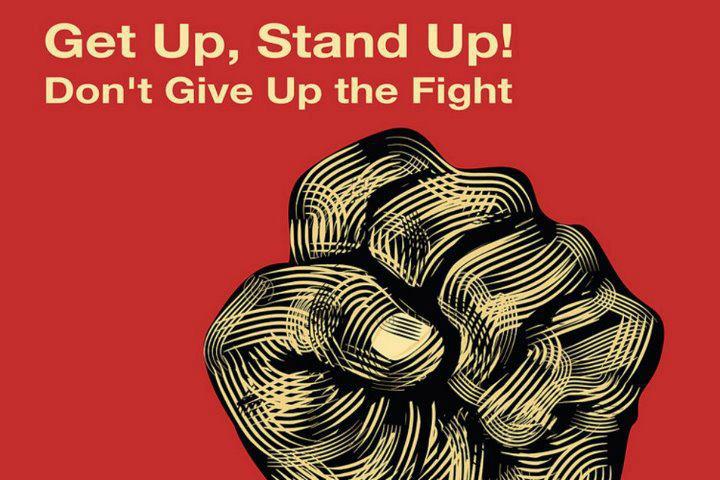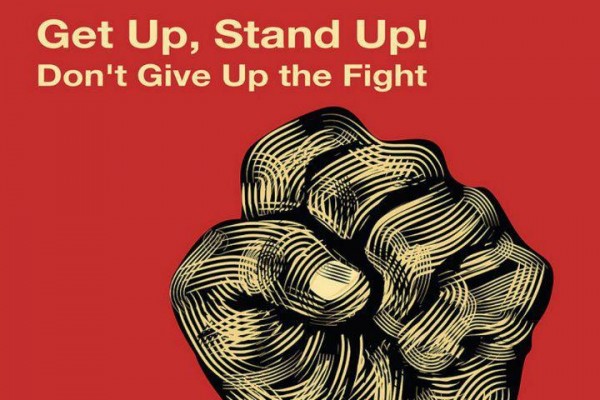When I told my chef boss I was calling a union meeting that night after work I felt physically sick. I had to work with this person every day, his sour face at my mentioning of the word union will remain etched in memory forever. Up to that point he had occasionally been lovely laughing and joking with us all but he also had been verbally harassing me and Emma my pregnant workmate unchecked for months. It was awkward and hard to make a stand but I gritted my teeth and did it.
Not that I had much at risk. What about Lupe, a grandmother refusing to sign new hours of work shoved in front of her face by her employer that meant she couldn’t bring in enough income for her kids? What about Ali an unemployed young woman, clutching her AAAP flyer, demanding to see the manager when her case manager at Work and Income refused to grant her a Job Seekers benefit?
Challenging power – whether it’s a bully at work, your employer, the boss at Work and Income or the gas company – is tough.
But when we do it, who hears about it? And if no-one hears about it, is it a missed opportunity to acknowledge and celebrate someone taking a very awkward but critical step to improve things for themselves and others? Is it a missed opportunity to inspire others to challenge? Is it a missed opportunity to increase involvement in broader political action?
We hear about the big stuff . Someone wins a major court case, the delegate on the protest march, the ex-employee posting an ostentatious YouTube clip resignation. But all this can feel so distant, so beyond our own experience . Maybe that person can lead a march down the main street but that’s not my reality. What about Lupe,Ali and Jerry ?
While these everyday examples of resistance may not in themselves change structural power imbalance or social conditions overnight, they serve as an important, and often unrecognised reminder that every single day people are taking steps to challenge their own exploitation.
Lupe’s workmates challenged their change of hours after they heard about what she did. Ali got her benefit and now her neighbours know how to get theirs. Jerry the cleaner took another risk after his experience, he contacted me and wants to share his story. He wonders if he might be able to help others who are in the same position as him.
Want to support this work? Donate today







Unions have been the traditional way of challenging employment issues but technology could potentially provide better methods.
Ask the younger generations if they’d rather be stuck in a traditional job, or crowd-sourcing something they actually enjoy doing.
Unions require meetings, regulations and you still have to answer to management who don’t want to give a millimeter.
Crowd-sourcing lets groups collaborate in a new way that is more consistent with the how the mind works. It relies more on solving a problem rather than supplying a lifetime of work…but what’s the point in a lifetime of work if you’re miserable doing it?
Unions create regulations that require paperwork, meetings and making deals that are generally unsatisfactory for everyone involved.
Crowd-sourcing is about doing what you want, when you want, having fun and getting paid for it. It thrives on having less regulation.
So rather than thinking short term about job protection, think about what the next generation could be doing.
If you want to challenge power, change the way you think about it.
In the US, they’ve gone as far as crowd-funding their own police.
http://slashdot.org/topic/cloud/oakland-crowdfunding-private-cops/
Digital communication and networks are great – but like all tools they must be suitable for the job.
Sometimes – you just need those people who over the years have accumulated knowledge and techniques – to do the negotiations (and sometimes confrontations) with employers.
The level of discussion and knowledge sharing in crowdsourcing is unlikely to meet this criteria.
‘Sometimes – you just need those people who over the years have accumulated knowledge and techniques – to do the negotiations (and sometimes confrontations) with employers.’
Of course there’s a need for such structures.
Just think about how technology can support them better though.
Think about a possible endpoint where crowdsourcing supports employees across multiple organisations. You still need project managers and contributors, which is the substance of a union.
Technology just makes it easier(although not very secure online right now).
Hear hear Tali. The bullies are getting away with far too much. Time for the battlers to take control of their struggle together and put an end to it.
A fight doesn’t have to be aggressive or violent. Leave that to the bullies on the other side.
I have always been a supporter of passive resistance or civil disobedience which is non confrontational, but can be effective if done in an organized way. It takes commitment, dedication to the cause and strong willpower to see it through, but many a struggle has been overcome in the past using these these protest tactics. Mahatma Gandhi, Martin Luther King are two amongst many examples who have achieved a specific aim through non aggression, despite having been on the receiving end of violence themselves.
A bully is someone who singles out an individual to push around and intimidate, more often than not, someone quite inoffensive, or from a minority section of society. The bully has the problem, not the victim, despite the unpleasantness involved. Bullies need to feel superior and the only way they can achieve this is by making someone else feel inferior. They get a buzz from it, because they have a character flaw! John Key is such, as demonstrated through his bullying tactics towards David Shearer in parliament.
However, successful passive challenges, can only be achieved through a collective, a situation which frightens bullies, because they are basically cowards.
A good reason Kiwis need to stand together as a well organized united front more often and face up the bullies, be it in the workplace, school or government or elsewhere. A united collective has strength, enough to bring the bullies down! And that’s what we have to do.
It is said that Gandhi was inspired by Te Whiti’s non-violent resistance against the British colonisers here in Aotearoa. I think that local activisms would do well to place in the foreground more often the foundational struggles against injustice that have been fought by the indigenous peoples against the settler government since “New Zealand” the settler colonial state was founded. This is a colonisation that we who have come afterwards have benefited from but don’t weave into our resistances often enough. If the country was founded on such injustice, of course this will pervade all facets of our society up to today.
The problem with bullying is a trickle from the top and this mentality dominates our lives as John Key bullies us and strips our assets as the USA bullies the entire world setting a president to be followed by anyone who want to be successful.
We now live in an age where might is right and any rights we still have to challenge the bully’s is fading.
Your right to challenge bullies and thugs is inborn and cannot be given by any outsider. You do it for yourself as a free man holding values and decency as essentials for a good life.
It doesn’t matter how much your knees and voice shake – do your homework, have your fall back plan in place – and make your stand.
The real boot on workers throats is the Employment Contracts Act. This is the real bullet in the gun of the employer. It promotes a divide and conquer negotiation process and renders any union impotent and by proxy stifles the voice of the individual. I’ve heard talk of repealing what the National Government have done in the past five years by David Cunliffe and I applaud it. But I’ve heard little in the way of amending or replacing the act itself. The Clark Government did nothing to reverse the previous National Governments crime against collective bargaining and I’ve yet to hear any plans to do so again. To cure a sickness you have to eliminate the root cause and not the symptoms. The act itself is the cause of workers woes…
Employment Relations Act – but yes, essentially the ECA in all but name – needs to be repealed and new Industrial Legislation put in place that strengthens collective bargaining and the rights of workers, restores industry awards and the right to strike in support of other claims.
Comments are closed.